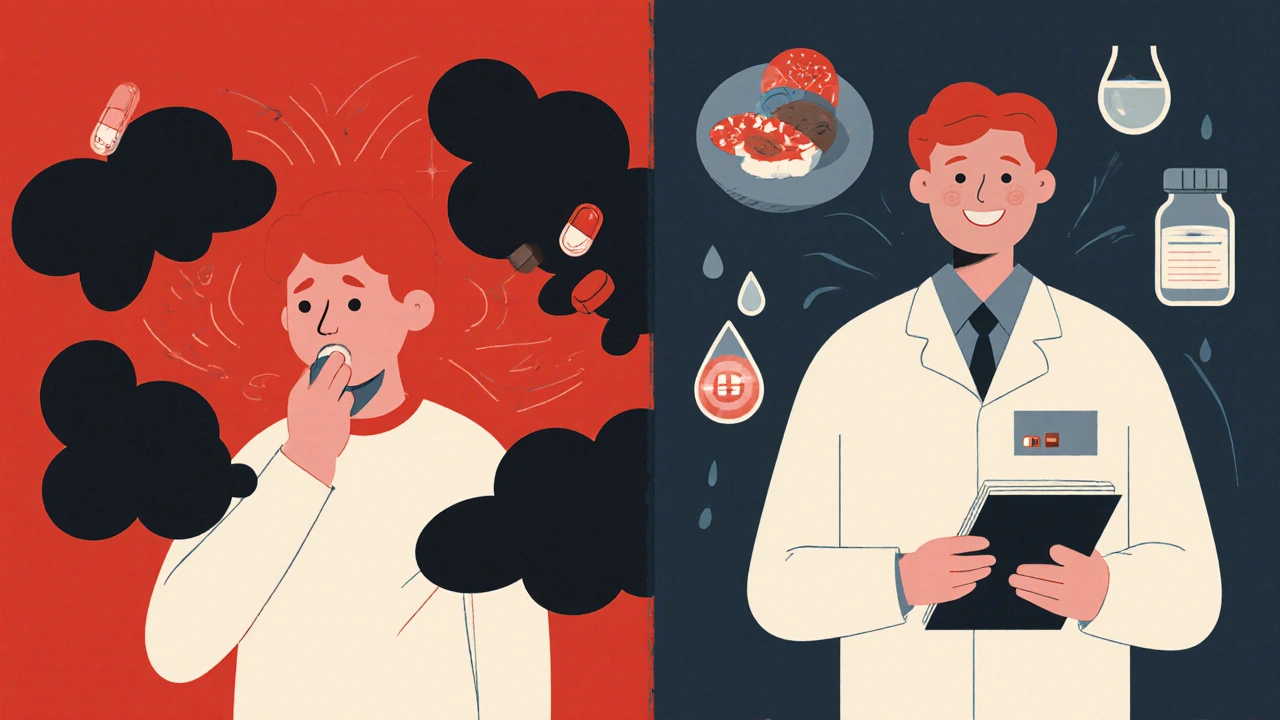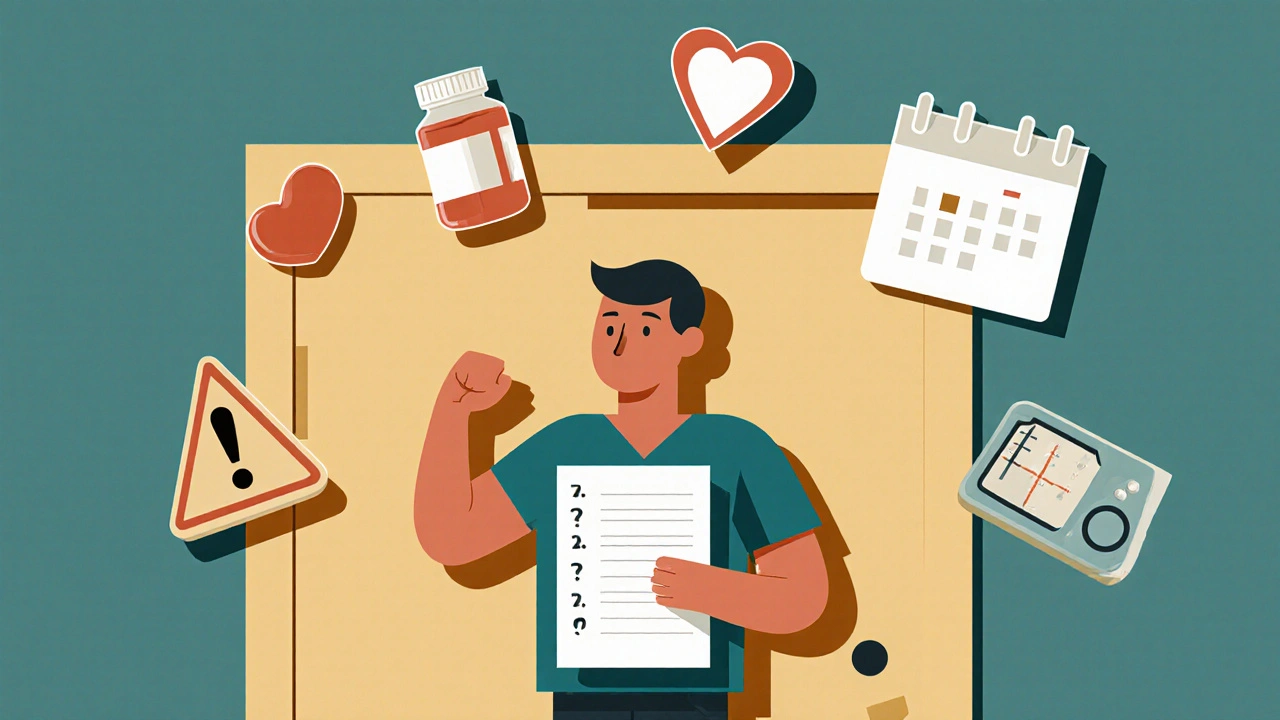Every year, over 1.3 million people in the U.S. end up in the emergency room because of unexpected reactions to medications. Many of these cases could have been avoided - not with better drugs, but with better questions. If you’re taking even one prescription, you need to know what to ask your doctor before you leave the office. It’s not about being difficult. It’s about staying safe.
Why am I taking this medicine?
Too many people take pills without understanding why. You might get a script for something you’ve never heard of, and assume the doctor knows best. But if you don’t know the purpose, you can’t tell if it’s working - or if it’s causing harm.Ask: "What condition is this meant to treat, and how will I know it’s helping?" Some medications, like statins or blood pressure pills, don’t cause obvious symptoms when they work. You might feel the same, but your labs are improving. Other drugs, like antibiotics or antidepressants, have clear timelines. Knowing what to expect helps you spot when something’s wrong.
What are the side effects?
This is the most important question. But most people don’t ask it the right way. Don’t just accept a list of 20 possible side effects. Ask for the ones that actually matter - the ones that happen often enough to affect your life.Focus on these three types:
- Common side effects - things that happen to more than 1 in 10 people. Dry mouth, dizziness, nausea, fatigue. These are annoying but usually manageable.
- Serious side effects - those that require immediate action. Signs include chest pain, trouble breathing, swelling of the face or throat, sudden confusion, or unusual bleeding. The FDA defines serious side effects as events that cause death, hospitalization, disability, or birth defects. These are rare, but you need to know what they look like.
- Hidden side effects - symptoms you might not connect to your medicine. Depression from beta-blockers, memory issues from anticholinergics, sexual dysfunction from antidepressants. These are often dismissed because they’re "not life-threatening," but they ruin quality of life.
Ask your doctor: "Which side effects should I watch for that could make me stop taking this?" That cuts through the noise.
What can I do if I experience side effects?
Knowing what to do is just as important as knowing what to expect. Many people stop their meds because they don’t know how to handle side effects - and that’s dangerous.For example:
- If you get stomach upset from metformin, taking it with food reduces nausea by up to 70%.
- If you’re dizzy from blood pressure meds, standing up slowly and staying hydrated can prevent falls.
- If you have dry mouth from an anticholinergic drug, sugar-free gum or sipping water throughout the day helps more than you think.
Ask: "Are there simple things I can do to reduce these side effects without stopping the medicine?" Often, the answer is yes - and your doctor should tell you.
Are there alternatives?
Not every drug is the only option. There are often multiple medications that treat the same condition with different side effect profiles.For older adults, the Beers Criteria lists 56 medications that should be avoided or used with extreme caution because of higher risk of confusion, falls, or kidney damage. Even if you’re younger, you might have other conditions - like liver disease, kidney issues, or diabetes - that make certain drugs riskier.
Ask: "Is there another medicine that works just as well but with fewer side effects for someone like me?" Generic versions often have the same effectiveness at a fraction of the cost. The FDA says generics save patients up to 89% on out-of-pocket expenses.
Do I still need to take this medicine?
Many people stay on medications long after they’re needed. A 2023 Cochrane Review found that 15.2% of prescriptions in older adults are continued unnecessarily. That’s not just wasteful - it’s dangerous.Think about:
- Antibiotics you took for an infection that’s long gone.
- Painkillers you started after an injury that healed months ago.
- Medications prescribed during a hospital stay that you never followed up on.
Ask: "Is this still necessary? Should I try to stop it or lower the dose?" Stopping some meds suddenly can be dangerous, so never quit cold turkey. But asking this question opens the door to deprescribing - a proven way to reduce side effects and improve health.

How does this interact with other drugs or supplements?
Most people take more than one medication. The CDC says 34.4% of adults 65-80 take five or more. That’s a recipe for dangerous interactions.Common risky combos:
- Warfarin + ibuprofen → increased bleeding risk (2.8 times higher).
- SSRIs + St. John’s Wort → serotonin syndrome.
- Statins + grapefruit juice → toxic buildup in the liver.
Don’t forget over-the-counter drugs and supplements. Diphenhydramine (found in sleep aids and allergy pills) is a hidden anticholinergic that can cause confusion and falls - especially when mixed with other meds.
Ask: "Could this interact with anything else I’m taking - even vitamins or herbal pills?" Bring your full list to the appointment. Pharmacists can check this better than most doctors.
Should I take this with food or on an empty stomach?
This seems small, but it matters. Food affects how your body absorbs 40% of all medications.Some drugs need food to work properly - like antibiotics (amoxicillin) or cholesterol meds (atorvastatin). Others must be taken on an empty stomach - like thyroid meds (levothyroxine) or certain osteoporosis drugs (alendronate). Taking them wrong can make them useless or even harmful.
Ask: "When’s the best time to take this? Can I take it with coffee, alcohol, or dairy?" Coffee can block absorption of some meds. Alcohol can worsen dizziness or liver damage. These details are rarely written on the label.
What should I do if my medicine looks different?
Pharmacies sometimes switch brands or generics. If your pill looks different - color, shape, markings - don’t assume it’s the same.The American Pharmacists Association reports that 1.2% of dispensing errors involve the wrong pill being given, even if the label is correct. That’s enough to cause harm, especially with high-risk drugs like blood thinners or seizure meds.
Ask: "Is this the same medicine I was taking before? Can you confirm the name and dose?" Always check the label against your prescription. If something looks off, call your pharmacy before taking it.
Will this make my other conditions worse?
Many people have multiple chronic conditions. A drug that helps one problem might make another worse.For example:
- Beta-blockers for high blood pressure can hide symptoms of low blood sugar in diabetics.
- NSAIDs like ibuprofen can worsen heart failure or kidney disease.
- Antidepressants can trigger mania in people with bipolar disorder.
Ask: "Could this make my asthma, diabetes, heart disease, or depression worse?" Your doctor needs to see the full picture - not just the reason for this one prescription.
When should I call you or go to the ER?
You need clear red flags. Don’t wait until you’re terrified to decide what to do.Ask: "What symptoms mean I should call you right away? What’s an emergency?" Get specific:
- "If I get chest pain that lasts more than 5 minutes, I should call 911?"
- "If my skin turns yellow or I can’t urinate, I need to come in?"
- "If I feel like I’m going to faint when I stand up, is that normal or dangerous?"
Write these down. Put them on your fridge or phone. This isn’t paranoia - it’s preparedness.
How do I keep track of all this?
Medication errors happen most often during care transitions - when you move from hospital to home, or switch doctors. The Joint Commission says 43.2% of errors occur during these times.Keep a simple list:
- Drug name (brand and generic)
- Dose
- Why you take it
- Side effects you’ve noticed
- When you take it
Update it within 48 hours of any change. Show it to every doctor, pharmacist, and ER staff member. It’s your best safety tool.
What if my doctor dismisses my concerns?
A 2024 Medscape survey found that 41.3% of patients felt their side effect concerns were ignored - especially with antidepressants, where sexual dysfunction affects up to 73% of users but is discussed in fewer than half of visits.If your doctor brushes you off:
- Ask for a referral to a pharmacist for a medication review.
- Request a second opinion.
- Use tools like the Institute for Safe Medication Practices’ free "Question Builder" to generate a personalized list of questions - it’s hard to ignore when you hand someone a printed sheet.
Your health isn’t negotiable. If you feel unheard, find someone who will listen.
Final tip: Prepare before your appointment
The average doctor visit lasts 15 minutes. The first 7 minutes are when 78% of medication decisions are made. If you walk in unprepared, you’ll miss your chance.Before your visit:
- Write down your questions - even if you think they’re silly.
- Bring all your meds (or a list with names, doses, and times).
- Write down any new or worsening symptoms.
- Ask if you can schedule a follow-up with a pharmacist.
Studies show patients who write questions in advance are more than twice as likely to ask them. That’s the difference between guessing and knowing.
What if I forget to ask my doctor about side effects during the appointment?
You can call your doctor’s office or pharmacy within 48 hours. Most practices have a nurse or pharmacist on staff who can answer medication questions. You can also use patient portals to send secure messages. Don’t wait until you’re in pain or confused - reach out as soon as possible.
Are side effects always listed on the medication label?
No. Labels include the most common or severe side effects, but not every possible one. Some side effects only show up after long-term use or in specific groups, like older adults or people with kidney disease. That’s why asking your doctor directly is essential.
Can I report side effects if I experience them?
Yes. The FDA’s MedWatch program lets patients report adverse reactions. These reports help identify new safety risks and improve drug labeling. Reporting doesn’t change your care, but it helps protect others. You can file a report online or by calling 1-800-FDA-1088.
Is it normal to feel anxious about side effects?
Yes - and that’s okay. But anxiety about side effects can become a problem if it leads you to stop taking necessary medication. Talk to your doctor about your fears. Sometimes, understanding the real risk (like knowing a side effect affects only 1 in 100 people) helps reduce fear. If anxiety is overwhelming, ask for support - a pharmacist, counselor, or support group can help.
Do I need to ask these questions every time I get a new prescription?
Yes. Medications change. Your health changes. What was safe last year might not be safe now. Even if you’ve taken a drug for years, ask the same questions during your annual review. Your body’s response can shift with age, other meds, or new health conditions.


Nicola Mari
November 28, 2025 AT 12:42Sam txf
November 29, 2025 AT 02:56Michael Segbawu
November 30, 2025 AT 10:44Aarti Ray
November 30, 2025 AT 23:44Alexander Rolsen
December 2, 2025 AT 20:01Leah Doyle
December 3, 2025 AT 04:26Alexis Mendoza
December 4, 2025 AT 10:54Brandon Trevino
December 4, 2025 AT 11:59